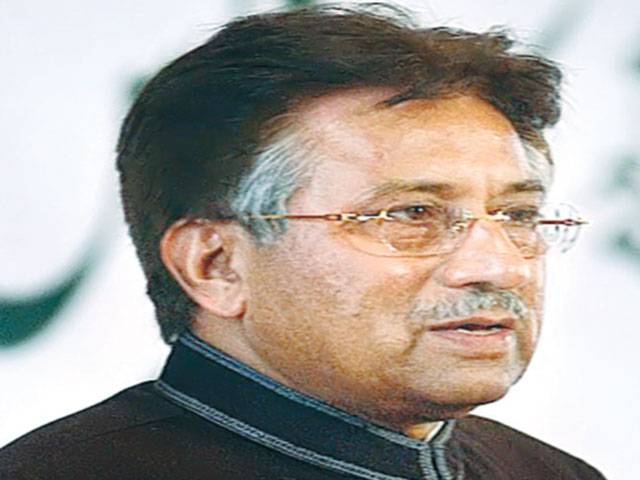ISLAMABAD - A three-judge Special Court, constituted by the federal government for the trial of former president Pervez Musharraf, on Friday summoned the former military dictator on December 24.
He is the country’s first military ruler to be charged for treason, and a conviction could lead to life imprisonment or the death penalty.
Musharraf came to power in 1999 by toppling Prime Minister Nawaz Sharif government and ruled till 2008. He on November 3, 2007 issued Emergency and Provisional Constitutional Order and Oath of Office (Judges) Order 2007.
Interior Secretary Shahid Ullah Khan on behalf of the federal government had Thursday filed a private complaint under Article 6 of the constitution and other relevant laws against the former president for subverting, abrogating, suspending, and holding in abeyance the constitution.
The special court comprising Justice Faisal Arab of the Sindh High Court, Justice Mohammad Yawar Ali Khan of the Lahore High Court and Justice Tahira Safdar of the Balochistan High Court on Friday examined the government request for the trial and decided to summon Pervez Musharraf. Special Court Registrar Abdul Ghani Soomro confirmed to the reporter that the former dictator has been summoned on Dec 24.
The FIA has written letter to SC Registrar for recording the statements of the seven judges of the apex court who were put to house arrest by Musharraf after imposition of Nov 3 Emergency. The Registrar Office has so far not responded to the FIA letters.
The federation seeks Musharraf trial, conviction and punishment as envisaged in Article 6 of Constitution. It prayed if the former dictator is found guilty of charges mentioned in the complaint then he be awarded punishment under Section 2(2) of High Treason (Punishment) Act, 1973, which says; “A person who is found guilty of high treason, as defined in Article 6 of Constitution, shall be punished with death or imprisonment for life.”
Five acts of the high treason against Pervez Musharraf have been mentioned in the complaint. First, on November 3, 2007, in his capacity as Chief of Army Staff (COAS), he issued a proclamation in his own name to hold the constitution in abeyance. Second, Musharraf in his capacity as Commander-in-Chief of Pakistan Army by adopting unconstitutional means abrogated, subverted/suspended/held in abeyance the constitution by issuing the Proclamation, hence committing the offence of high treason as defined in Article 6 of the constitution.
Third, Musharraf as self-appointed COAS vide notification Sept 2, 2007-Min-I on Nov 3, 2007 also issued Provisional Constitution Order (PCO) No.1 of 2007. By issuing PCO No.1 of 2007, express letter and spirit of the Part II, Part III, Part IV, Part VII, Part XI and Part XII of the constitution was abrogated, subverted and suspended. Musharraf by issuing Oath of Office (Judges) Order 2007 grossly abrogated and subverted the letter and spirit of Part I, Part II and Part VII of constitution. Through issuing Oath of Office of (Judges) Musharraf also committed third act of high treason.
Fourth, Provisional Constitution (Amendment) Order 2007, issued by the former military dictator also abrogated, subverted and suspended the letter and spirit of various provisions of the constitution including it Part I and Part XI.
Fifth, Musharraf, who had occupied the office of president since June 2001 by issuing Constitution (Second Amendment) Order, 2007 further amended Article 41, 44, 193, 194, 208 and 270C of the constitution, which removed the constitutional bars in Article 44 and 63 to his third term election in uniform during the pendency of his case in the Supreme Court. He committed this fifth act of high treason in furtherance of his self-serving objectives.
“The retired general intentionally committed the (above said) offences to perpetuate his illegal occupation of highest state office, used for unconstitutional rule and to ward off any possible adverse verdict that could disrupt his continuous usurpation of power and to thwart the sub judice case.”
Friday, April 26, 2024
Court summons Musharraf on 24th
Treason case

PM approves in principle reforms in power sector
April 26, 2024
Pak-Iran gasline project to be completed: Kh Asif
April 26, 2024
Pakistan rejects US report on HR practices
April 26, 2024
No room for criminals in Punjab: CM Maryam
April 26, 2024
PTI’s talks with terrorists hindered NAP execution: Tarar
April 26, 2024
Economic Challenges
April 26, 2024
No Compromise
April 26, 2024
Strength and Solidarity
April 26, 2024
Musk vs Australia
April 25, 2024
Reforming Rehab
April 25, 2024
Photon power
April 26, 2024
Justice prevails
April 26, 2024
Ending animal suffering
April 25, 2024
AI governance
April 25, 2024
AI concerns
April 25, 2024
ePaper - Nawaiwaqt
Advertisement
Nawaiwaqt Group | Copyright © 2024





